To bubble, or not to bubble? That is the question.
I am both a scuba diving and freediving instructor and a question people often ask me is “Which do you prefer?”. It’s also a question that is really hard to answer. Whilst both freediving and scuba diving have their obvious similarities they are also very dissimilar in some ways.
I’m going to take a look at a few different aspects of scuba diving and freediving, give you my thoughts about them and – dare I say it? – which is better.
History
Let’s start with their history. Humans have been freediving since before we existed! There’s evidence that our ancestors, the Neanderthals, dived for shellfish and suffered from surfer’s ear from spending so much time in the water. The ancient Greeks dived for sponges and the Ama women for pearls. The Moken spend so much time underwater that their eyesight has adapted so that they can see better beneath the waves. Recreationally, however, freediving is still a fairly new sport compared to scuba diving. Any diver who has seen the type of scuba gear used in the 1960s will attest to how much it has evolved but if we’re talking history, then freediving is the real winner here.
Equipment
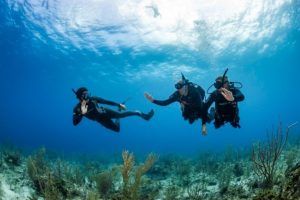
OK, this is an easy win for freediving. To go scuba diving I need a tank, BCD, regulator, mask, fins, snorkel, wetsuit, dive computer, compass, SMB… the list goes on and I’ve already spent easily $1500+ USD. Don’t even get me started on technical or cave diving where you can spend that amount just on a torch! With freediving things are obviously a lot simpler. Typical attire will consist of mask, snorkel, wetsuit and fins and you’re good to go. That’s not to say a freediver doesn’t have things to spend their pocket money on. For example a scuba diver would baulk at the thought of spending 500+ dollars on a pair of fins!
One thing to note is that your freediving mask, snorkel, weightbelt and wetsuit can be always be used for scuba diving but when these items are designed for scuba they are not always suitable for freediving. When you take a freediving course you will find out why freedivers have specialized equipment.
So another win for freediving.
Things to see
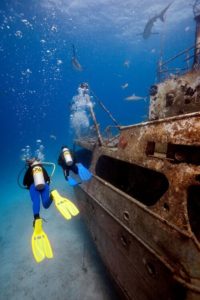
Surely the scuba diver will get to enjoy their underwater surroundings more than a freediver? Spending more time underwater, slowly gliding along on scuba does mean that you have time to check out the beautiful reef and marine life on your way. You can also freedive to view your surroundings (think the majestic Whale Shark that visits this region every summer). For a lot of freedivers though, most of their time involves training on a line and many people – myself included – tend to close their eyes for most of their descent as it helps them to relax.
With scuba diving, the possibilities of what to do with your bottom time are endless – you can search out tiny nudibranchs, explore ancient wrecks, or dive with sharks, to name a few. All of which are easier when you have more time.
Finally we have a win for scuba!
Ease to learn
Now this is a difficult one. At first freediving would seem to be easier to learn, with hardly any equipment. I mean, how hard can it be to hold your breath and relax? If we look at the beginner courses, an average PADI Open Water Diver course takes approx. 3 to 4 days and a PADI Freediver course takes 2 to 3 days (exactly how long the courses take will depend on how quickly you master the skills required). Both have some basic dive theory and in both courses you learn to equalize your ears. While there are more individual skills to learn in a scuba course, there’s more to freediving than you initially might think. For a new freediver, equalization can be tricky to get the hang of, even for the ones who have been equalizing happily for years on scuba without giving it a second thought. There are also breathing and diving techniques to learn which are just as important.
With scuba and freediving, a beginner’s course gives a diver the basics and further practice and training is always recommended.
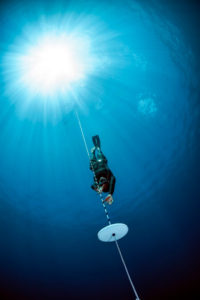 But in my opinion it is after the beginner course that the differences are more noticeable. Continuing your education in scuba diving is a matter of refining some skills, developing a few new ones and expanding knowledge – something that can be done fairly rapidly with enough enthusiasm and experience. But for freediving it’s important for the diver to advance steadily. There are dangers in progressing to deeper depths too quickly before the body has had the opportunity to adapt. Later on, equalization beyond certain depths becomes a whole new ball game in itself! Freediving also has an added element of psychology – some would say the sport is 90% mental.
But in my opinion it is after the beginner course that the differences are more noticeable. Continuing your education in scuba diving is a matter of refining some skills, developing a few new ones and expanding knowledge – something that can be done fairly rapidly with enough enthusiasm and experience. But for freediving it’s important for the diver to advance steadily. There are dangers in progressing to deeper depths too quickly before the body has had the opportunity to adapt. Later on, equalization beyond certain depths becomes a whole new ball game in itself! Freediving also has an added element of psychology – some would say the sport is 90% mental.
So whether it’s equalization, technique or the mind, the more you progress with freediving, the more hurdles you seem to find. But I find that the challenge is half the fun!
Result: After careful consideration, I’m giving scuba diving a “win” for ease.
Safety
Is scuba diving safe? Is freediving safe? Prudent questions to ask if you have considered doing either. Here I think is where there are more similarities than differences.
Firstly it’s important to say that both freediving and scuba diving carry some inherent risk but that both activities have a lot of safety procedures in place to minimize that risk.
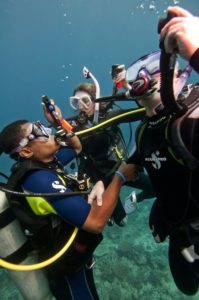 Scuba diving, as a recreational activity, has been around longer and there are more scuba divers who participate in that activity. That means more reported accidents, but also more research into why accidents happen and to improve safety.
Scuba diving, as a recreational activity, has been around longer and there are more scuba divers who participate in that activity. That means more reported accidents, but also more research into why accidents happen and to improve safety.
The general public’s perception of scuba diving is positive. Less so I think with freediving. Much of the general, non-freediving public has probably only heard of the no-limits record-breaking attempts of the 1980s as featured in movies like The Big Blue. Freediving competitions were relatively new and there were stories of blackouts and other accidents that went along with the sport at that time.
Neither scuba nor freediving can be entirely risk-free, but if you take a course in either you will learn how to avoid problems and what to do if something does go wrong. In both activities, the buddy system is vitally important. Most serious freediving accidents involve divers who have had no formal training or have not followed the proper buddy system. That’s why it’s so important to take a course. Problems can be avoided simply by having a buddy who is watching out for you and knows what to do if something goes pear-shaped.
So with both scuba and freediving if you are properly trained, dive within your (and your buddy’s) limits and follow recommended safety procedures, they are very safe.
Result: it’s a draw for safety.
Ability to take over your life
As a PADI Course Director and Freediver Instructor who thirteen years ago was working as a lawyer in the north of England, I am happy to say that both breath-holding and bubble-blowing have taken over and changed my life considerably. Lack of either scuba or freediving can give people serious withdrawal symptoms. The covid pandemic and travel restrictions of 2020 meant that many of us experienced these more than usual.
For most people who recreationally do these activities I think the majority would class scuba diving as a hobby or pastime, but would describe freediving as a sport, and a freediver as an “athlete”. If you partake in any sport you need to train regularly to maintain or improve your level and that’s when the take-over really starts. One month without freediving is a long time! Even if they can’t get wet, a freediver still has plenty of things to do to keep their body and mind in shape, such as CO2 and O2 training tables, stretching exercises, pranayama etc.
So I’m confident that freediving gets a win in this category.
Enjoyment
It’s going to be very different for everyone so I am writing only from my personal experience here. I’m not talking about teaching these activities either. I fear that will be a whole new blog post in due course.
Scuba diving for me is pure fun. Kind of like a gentle ride in a theme park or underwater safari where you enjoy the experience, point out all the cool things you see, and discuss them afterwards with your dive group. Now that my son is a certified PADI Adventure Diver, this fun has been amplified. It’s a joy to see the excitement on his face underwater when we dive together.
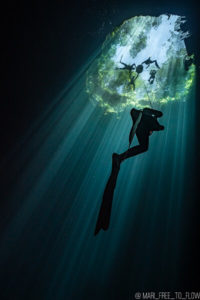 Freediving, on the other hand, is a more solitary activity, even though you’re coordinating everything with your buddy/safety diver. When I’m freediving I am “in the zone” and its just me and my thoughts (I’m still working on having less thoughts, actually). There is an aspect of challenge and competitiveness, but only with myself. Maybe that doesn’t sound like too much fun, but the sense of achievement I feel when I see improvements in my diving is wonderful. Plus, the feeling of freedom – travelling as deep or as far as you desire purely by your own body’s power without any tank – should not be underestimated.
Freediving, on the other hand, is a more solitary activity, even though you’re coordinating everything with your buddy/safety diver. When I’m freediving I am “in the zone” and its just me and my thoughts (I’m still working on having less thoughts, actually). There is an aspect of challenge and competitiveness, but only with myself. Maybe that doesn’t sound like too much fun, but the sense of achievement I feel when I see improvements in my diving is wonderful. Plus, the feeling of freedom – travelling as deep or as far as you desire purely by your own body’s power without any tank – should not be underestimated.
Finally, I don’t think a scuba diver gives any thought to their surface interval “enjoyment”. A freediver spends more time on the surface than underwater so their surroundings become important. Here in Playa del Carmen, Mexico we are lucky to have the famous cenotes which are amazing places to learn to freedive and to train. Being surrounded by peace and nature adds a lot to the enjoyment factor.
Because the two activities are, in my opinion, so different when it comes to enjoyment, I simply can’t decide and its another draw.
So, Scuba Diving v Freediving – which is better?
Come on, you didn’t think I would actually declare a winner did you? Scuba and freediving are both amazing things to do and each have their own qualities which fit my different moods and desires. If you have only tried one – or neither – you are definitely missing out!
Are you a scuba and freediver? Leave a comment and let us know if you agree or disagree.
We offer both recreational scuba and freediving courses, as well as professional-level training, technical and cave diving in the Riviera Maya, Mexico. Use the Contact Us button below to ask us for more information
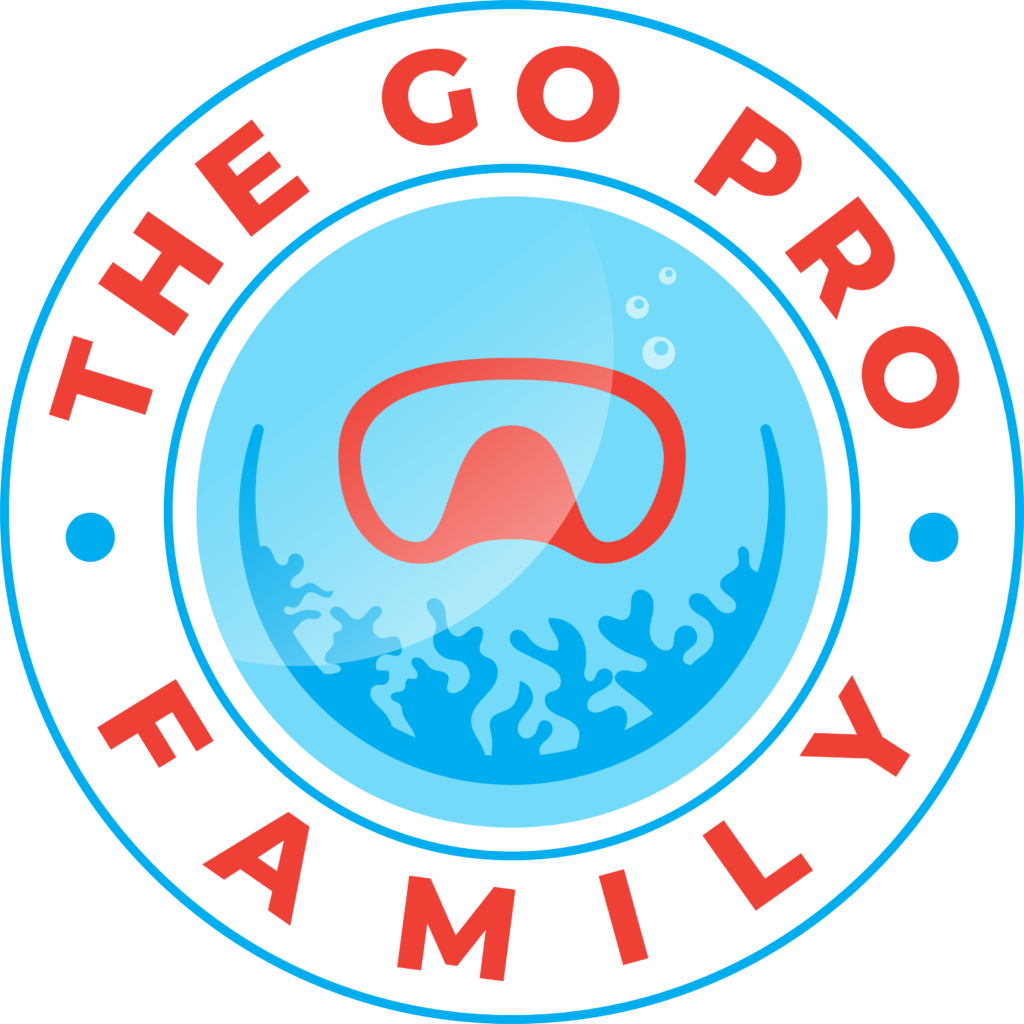
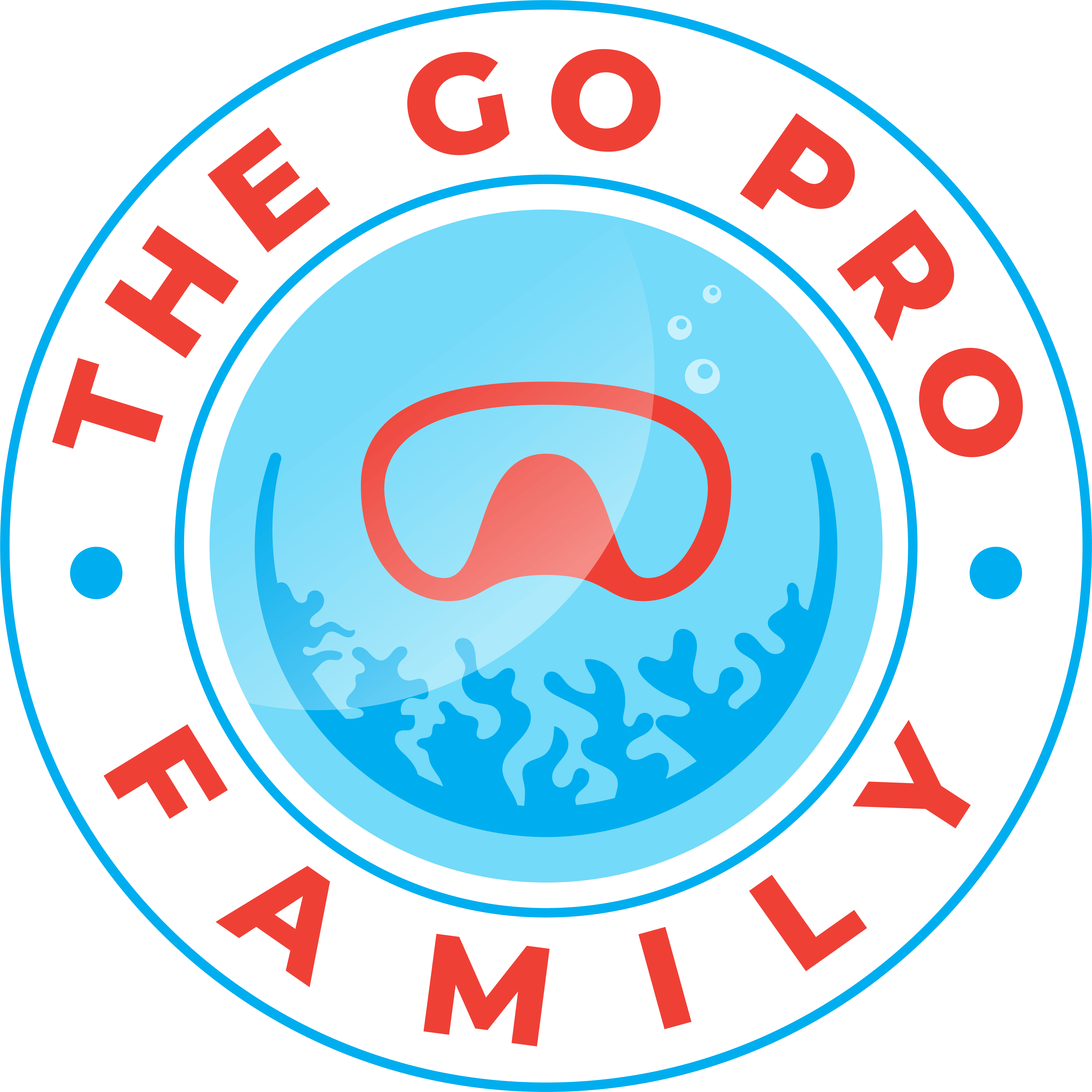
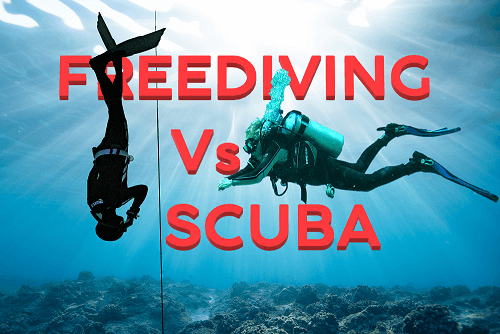
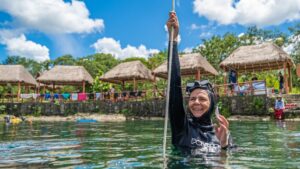
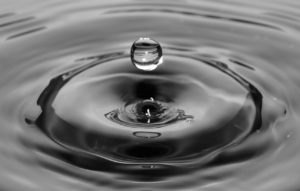

Just because both happen in water dosent mean you can compare them like that. I been spearfishing for years and just started scuba diving last year and its like a totaly new world i totaly love both ❤️
That’s great that you do both and love them. So do we!
Excellent description and explanations. A good read!